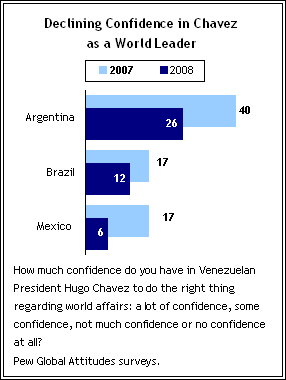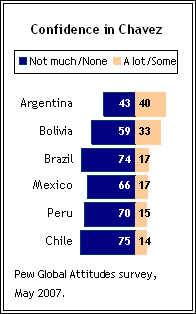by Kathleen Holzwart, Research Analyst, Pew Global Attitudes Project
On February 15, Venezuelans will head to the polls to vote on a constitutional amendment that would eliminate term limits for the office of president, permitting current President Hugo Chavez to seek a third term. Since he was first elected in 1999, Chavez has often portrayed himself as a regional leader, at the forefront of a new era of Latin American populism. However, in many Latin American countries, Chavez fails to inspire much confidence. In fact, polling by the Pew Research Center’s Global Attitudes Project suggests that negative views of Chavez are on the rise in several key Latin American nations.
Regional Views of Chavez
 Among his fellow Venezuelans, a 2007 Pew Global Attitudes survey found that Chavez was relatively popular. However, as discussed further below, more recent polls suggest that Venezuelans are closely divided over his rule.
Among his fellow Venezuelans, a 2007 Pew Global Attitudes survey found that Chavez was relatively popular. However, as discussed further below, more recent polls suggest that Venezuelans are closely divided over his rule.
Elsewhere in the region, the 2007 survey found little confidence in Chavez to do the right thing in world affairs among the Latin American countries surveyed. In fact, fewer than one-in-five said they have confidence in Chavez’s ability as a global leader in Brazil (17%), Mexico (17%), Peru (15%) and Chile (14%). Even in the country led by one of Chavez’s closest allies — Bolivia’s Evo Morales — only one-third expressed confidence in the Venezuelan leader. Opinions about Chavez were more mixed in Argentina, where nearly as many expressed confidence as lacked confidence (40% vs. 43%, respectively).
 Between 2007 and 2008, confidence in Chavez declined in all of the three Latin American countries included in the 2008 Global Attitudes poll — Argentina, Brazil and Mexico. In Argentina, only a quarter (26%) held a lot or some confidence in Chavez in 2008, a drop of 14 percentage points from 2007. Similarly in Mexico, confidence ratings in Chavez declined 11 percentage points from 17% to 6%. In Brazil, the drop was less substantial, from 17% to 12%.
Between 2007 and 2008, confidence in Chavez declined in all of the three Latin American countries included in the 2008 Global Attitudes poll — Argentina, Brazil and Mexico. In Argentina, only a quarter (26%) held a lot or some confidence in Chavez in 2008, a drop of 14 percentage points from 2007. Similarly in Mexico, confidence ratings in Chavez declined 11 percentage points from 17% to 6%. In Brazil, the drop was less substantial, from 17% to 12%.
Venezuelan Views of Chavez
While the 2007 poll revealed that Chavez was unpopular throughout much of the region, he received relatively positive marks in his home country. A slim majority of Venezuelans (54%) expressed confidence that their president would do the right thing in world affairs, while just 45% had little or no confidence.
 The poor have often been considered Chavez’s political base, and in the 2007 survey he received more favorable ratings from lower-income and less-educated Venezuelans. Lower-income Venezuelans were considerably more likely to express confidence in Chavez than were their wealthier counterparts (61% vs. 49%). Moreover, six-in-ten Venezuelans with a high school education or less said that they had confidence in Chavez, compared with only 36% of those with more education.
The poor have often been considered Chavez’s political base, and in the 2007 survey he received more favorable ratings from lower-income and less-educated Venezuelans. Lower-income Venezuelans were considerably more likely to express confidence in Chavez than were their wealthier counterparts (61% vs. 49%). Moreover, six-in-ten Venezuelans with a high school education or less said that they had confidence in Chavez, compared with only 36% of those with more education.
In 2007, a majority of Venezuelans not only held positive views about Chavez’s foreign affairs’ abilities but also had a positive view about his general impact on their country. In 2007, six-in-ten said that Chavez had a good influence on the way things were going in their country, while 38% said he was a bad influence. Again, lower-income and less-educated Venezuelans were more likely to hold positive views about their president’s impact on the country.
However, more recent polling indicates that views of Chavez have grown more critical in Venezuela. For example, a poll conducted from May to June 2008 by the Venezuelan polling firm Alfredo Keller y Asociados (AKSA) indicated that 47% had a positive opinion of Chavez, down from 59% one year earlier and 64% in 2006.
With the referendum less than a week away, recent polls suggest that there may be a close vote on the constitutional amendment. The Economist reported in its Feb. 5 issue that reputable opinion polls show the referendum passing by a small margin.1 However, other recent polls show that the referendum will fail to pass — indicating that it may soon be the end of the road for the Venezuelan president.


